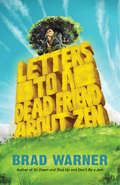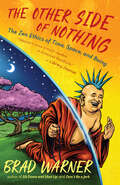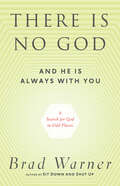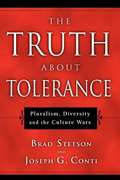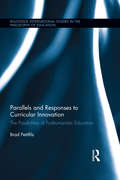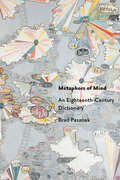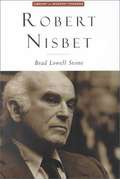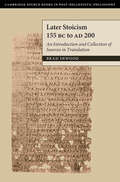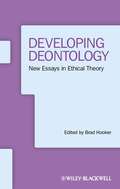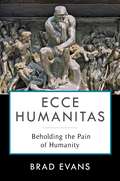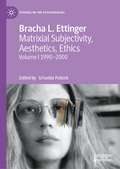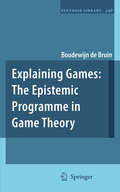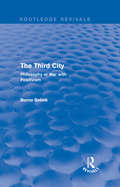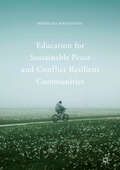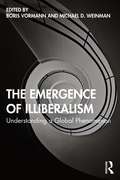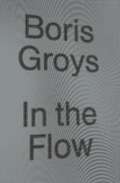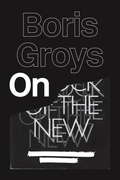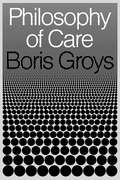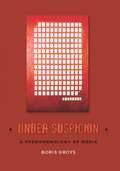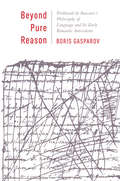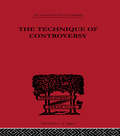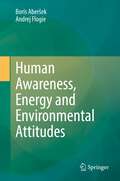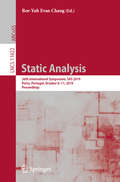- Table View
- List View
Letters to a Dead Friend about Zen
by Brad WarnerThe night Brad Warner learns that his childhood friend Marky has died, Warner is about to speak to a group of Zen students in Hamburg, Germany. It’s the last thing he feels like doing. What he wants to do instead is tell his friend everything he never said, to explain Zen and what he does for a living and why he spends his time “Sitting. Sitting. Sitting. Meditating my life away as it all passes by. Lighting candles and incense. Bowing to nothing.” So, as he continues his teaching tour through Europe, he writes to his friend all the things he wishes he had said. Simply and humorously, he reflects on why Zen provided him a lifeline in a difficult world. He explores grief, attachment, and the afterlife. He writes to Marky, “I’m not all that interested in Buddhism. I’m much more interested in what is true,” and then proceeds to poke and prod at that truth. The result for readers is a singular and winning meditation on Zen — and a unique tribute to both a life lost and the one Warner has found.
The Other Side of Nothing: The Zen Ethics of Time, Space, and Being
by Brad WarnerA reader-friendly guide to Zen Buddhist ethics for modern times In the West, Zen Buddhism has a reputation for paradoxes that defy logic. In particular, the Buddhist concept of nonduality — the realization that everything in the universe forms a single, integrated whole — is especially difficult to grasp. In The Other Side of Nothing, Zen teacher Brad Warner untangles the mystery and explains nonduality in plain English. To Warner, this is not just a philosophical problem: nonduality forms the bedrock of Zen ethics, and once we comprehend it, many of the perplexing aspects of Zen suddenly make sense. Drawing on decades of Zen practice, he traces the interlocking relationship between Zen metaphysics and ethics, showing how a true understanding of reality — and the ultimate unity of all things — instills in us a sense of responsibility for the welfare of all beings. When we realize that our feeling of separateness from others is illusory, we have no desire to harm any creature. Warner ultimately presents an expansive overview of the Zen ethos that will give beginners and experts alike a deeper understanding of one of the world’s enduring spiritual traditions.
There Is No God and He Is Always with You: A Search for God in Odd Places
by Brad WarnerCan you be an atheist and still believe in God? Can you be a true believer and still doubt? Can Zen give us a way past our constant fighting about God? Brad Warner was initially interested in Buddhism because he wanted to find God, but Buddhism is usually thought of as godless. In the three decades since Warner began studying Zen, he has grappled with paradoxical questions about God and managed to come up with some answers. In this fascinating search for a way beyond the usual arguments between fundamentalists and skeptics, Warner offers a profoundly engaging and idiosyncratic take on the ineffable power of the “ground of all being.”
The Truth About Tolerance: Pluralism, Diversity and the Culture Wars
by Brad Stetson Joseph G. ContiStetson and Conti argue just the opposite: that true tolerance requires the pursuit of truth. In the end they demonstrate that Christian conviction about religious truth provides the only secure basis for a tolerant society which promotes truth seeking. Christians can contribute to civil debate without compromising their moral and spiritual convictions.
Parallels and Responses to Curricular Innovation: The Possibilities of Posthumanistic Education (Routledge International Studies in the Philosophy of Education #36)
by Brad PetitfilsThis volume explores two radical shifts in history and subsequent responses in curricular spaces: the move from oral to print culture during the transition between the 15th and 16th centuries and the rise of the Jesuits, and the move from print to digital culture during the transition between the 20th and 21st centuries and the rise of what the philosopher Jean Baudrillard called "hyperreality." The curricular innovation that accompanied the first shift is considered through the rise of the Society of Jesus (the Jesuits). These men created the first "global network" of education, and developed a humanistic curriculum designed to help students navigate a complicated era of the known (human-centered) and unknown (God-centered) universe. The curricular innovation that is proposed for the current shift is guided by the question: What should be the role of undergraduate education become in the 21st century? Today, the tension between the known and unknown universe is concentrated on the interrelationships between our embodied spaces and our digitally mediated ones. As a result, today’s undergraduate students should be challenged to understand how—in the objectively focused, commodified, STEM-centric landscape of higher education—the human subject is decentered by the forces of hyperreality, and in turn, how the human subject might be recentered to balance our humanness with the new realities of digital living. Therein, one finds the possibility of posthumanistic education.
Metaphors of Mind: An Eighteenth-Century Dictionary
by Brad PasanekA pathbreaking introduction to eighteenth-century metaphors of the mind that recasts the grand narrative of the Enlightenment in terms of its tropes and figures.An encyclopedic dictionary along the lines of Voltaire’s classic Dictionnaire Philosophique, Metaphors of Mind provides an in-depth look at the myriad ways in which Enlightenment writers used figures of speech to characterize the mind. Drawn from Brad Pasanek’s massive online archive, http://metaphorized.net, this volume constitutes a veritable treasury of mental metaphorics.Dividing the book into eleven broad metaphorical categories—Animals, Coinage, Court, Empire, Fetters, Impressions, Inhabitants, Metal, Mirror, Rooms, and Writing—Pasanek maps out constellations of metaphors. He frames his collection of literary excerpts in each section with a more descriptive and theoretical discussion of what he calls "desultory reading," a form of unsystematic perusal of writing frequently employed by Enlightenment thinkers. By surveying the printed past alongside the digital present, the book treats eighteenth-century writing as its topic while essentially exemplifying its rhetorical approach.More than an exercise in quotation, this intellectual history offers illuminating readings of fragmentary literary works and confrontations with neoclassical and contemporary theories of metaphor. The book’s entries complicate received ideas about Locke’s blank slate, question M. H. Abrams’ claims about mirrors and lamps, and chart changing frequencies of metal metaphors in a moment of industrial revolution. The book also responds to current anxieties about reading and the mass digitization of literature, touching on recent discussions of "distant reading," "shallow reading," and "surface reading." Promoting critical and creative anachronism, Metaphors of Mind redefines the notion of an archive in the age of Amazon and Google Books.
Robert Nisbet: Communitarian Traditionalist
by Brad Lowell StoneThis is the only book-length intellectual biography of sociologist Robert Nisbet (1913-1996).
Ethics After Aristotle
by Brad InwoodFrom the earliest times, philosophers and others have thought deeply about ethical questions. But it was Aristotle who founded ethics as a discipline with clear principles and well-defined boundaries. Ethics After Aristotle focuses on the reception of Aristotelian ethical thought in the Hellenistic and Roman worlds, underscoring the thinker's enduring influence on the philosophers who followed in his footsteps from 300 BCE to 200 CE. Beginning with Aristotle's student and collaborator Theophrastus, Brad Inwood traces the development of Aristotelian ethics up to the third-century Athenian philosopher Alexander of Aphrodisias. He shows that there was no monolithic tradition in the school, but a rich variety of moral theory. The philosophers of the Peripatetic school produced surprisingly varied theories in dialogue with other philosophical traditions, generating rich insight into human virtue and happiness. What unifies the different strands of thought--what makes them distinctively Aristotelian--is a form of ethical naturalism: that our knowledge of the good and virtuous life depends first on understanding our place in the natural world, and second on the exercise of our natural dispositions in distinctively human activities. What is now referred to as "virtue ethics," Inwood argues, is a less important part of Aristotle's legacy than the naturalistic approach Aristotle articulated and his philosophical descendants developed further. Offering a wide range of ways of thinking about ethics from an ancient perspective, Ethics After Aristotle is a penetrating study of how philosophy evolves in the wake of an unusually powerful and original thinker.
Later Stoicism 155 BC to AD 200: An Introduction and Collection of Sources in Translation
by Brad InwoodMost modern readers of the Stoics think first of later authors such as Seneca, Epictetus and Marcus Aurelius. Existing works like Long and Sedley's The Hellenistic Philosophers concentrate on the Stoics of the early school. This book focusses on the more influential later school, including key figures like Panaetius and Posidonius, and provides well-chosen selections from the full range of Stoic thinkers. It emphasizes their important work in logic, physics and cosmology as well as in ethics. Fresh translations and incisive commentary present a picture of Stoic thought informed by up-to-date historical research and philosophical analysis. The book will be essential for scholars and students of ancient philosophy and of Hellenistic and Roman culture.
The Cambridge Companion to the Stoics
by Brad InwoodThis unique volume offers an odyssey through the ideas of the Stoics in three particular ways: first, through the historical trajectory of the school itself and its influence; second, through the recovery of the history of Stoic thought; third, through the ongoing confrontation with Stoicism, showing how it refines philosophical traditions, challenges the imagination, and ultimately defines the kind of life one chooses to lead. A distinguished roster of specialists have written an authoritative guide to the entire philosophical tradition. The first two chapters chart the history of the school in the ancient world, and are followed by chapters on the core themes of the Stoic system: epistemology, logic, natural philosophy, theology, determinism, and metaphysics. There are two chapters on what might be thought of as the heart and soul of the Stoics system: ethics.
Developing Deontology: New Essays in Ethical Theory (Ratio Special Issues #14)
by Brad HookerDeveloping Deontology consists of six new essays in ethical theory by leading contemporary moral philosophers. Each essay considers concepts prominent in the development of deontological approaches to ethics, and these essays offer an invaluable contribution to that development. Essays are contributed by Michael Smith, Philip Stratton-Lake, Ralph Wedgewood, David Owens, Peter Vallentyne, and Elizabeth Harman - all leading contemporary moral philosophers Each essay offers an original and previously unpublished contribution to the subject A significant addition to the field for anyone with an interest in the development of deontology The collection is edited by a leading philosophical scholar
Ecce Humanitas: Beholding the Pain of Humanity (Insurrections: Critical Studies in Religion, Politics, and Culture)
by Brad EvansThe very idea of humanity seems to be in crisis. Born in the ashes of devastation after the slaughter of millions, the liberal conception of humanity imagined a suffering victim in need of salvation. Today, this figure appears less and less capable of galvanizing the political imagination. But without it, how are we to respond to the inhumane violence that overwhelms our political and philosophical registers? How can we make sense of the violence that was carried out in the name of humanism? And how can we develop more ethical relations without becoming parasitic on the pain of others?Through a critical exploration of violence and the sacred, Ecce Humanitas recasts the fall of liberal humanism. Brad Evans offers a rich analysis of the changing nature of sacrificial violence, from its theological origins to the exhaustion of the victim in the contemporary world. He critiques the aestheticization that turns victims into sacred objects, sacrificial figures that demand response, perpetuating a cycle of violence that is seen as natural and inevitable. In novel readings of classic and contemporary works, Evans traces the sacralization of violence as well as art’s potential to incite resistance. Countering the continued annihilation of life, Ecce Humanitas calls for liberating the political imagination from the scene of sacrifice. A new aesthetics provides a form of transgressive witnessing that challenges the ubiquity of violence and allows us to go beyond humanism to imagine a truly liberated humanity.
Matrixial Subjectivity, Aesthetics, Ethics: Volume 1 1990–2000 (Studies in the Psychosocial)
by Bracha L. EttingerThis book is the first of two volumes that, together, present for the first time a comprehensive collection of three decades of the theoretical writings of artist and theorist Bracha L Ettinger. Edited and introduced by Griselda Pollock they provide a systematic anthology of Ettinger’s path-breaking and influential concept of Matrixial subjectivity-as-encounter and jointness-in-difference, and chart her radical intervention in aesthetics, ethics and theories of subjectivity far beyond classical feminist and current gender/queer theory.This first volume includes the writings in which Ettinger elaborates her original concepts of Matrixial space-time and metramorphosis, fascinance, wit(h)nessing, resonance, transcryptum, com-passion, self-fragilization and resistance, co-emergence and copoiesis transform theories of the subject, Eros, alliance and love, sexual difference, alterity, relationality, trauma and violence. Her critical dialogue with theorists including Levinas, Lacan, Lyotard and Deleuze & Guattari, Butler, Cavarero and Irigaray is evident here.A leading authority on Matrixial theory, Griselda Pollock provides explanatory prefaces to each chapter and a lengthy introduction that situates Ettinger’s work in relation to socio-psychoanalytical theory and practice and current social and philosophical debates. Ettinger’s interlacing of psychoanalysis, ethics, and aesthetics can be seen here to address some of the deepest challenges of our social, cultural and political existence today.
Explaining Games
by Boudewijn De BruinDoes game theory - the mathematical theory of strategic interaction - provide genuine explanations of human behaviour? Can game theory be used in economic consultancy or other normative contexts? Explaining Games: The Epistemic Programme in Game Theory - the first monograph on the philosophy of game theory - is a bold attempt to combine insights from epistemic logic and the philosophy of science to investigate the applicability of game theory in such fields as economics, philosophy and strategic consultancy. De Bruin proves new mathematical theorems about the beliefs, desires and rationality principles of individual human beings, and he explores in detail the logical form of game theory as it is used in explanatory and normative contexts. He argues that game theory reduces to rational choice theory if used as an explanatory device, and that game theory is nonsensical if used as a normative device. A provocative account of the history of game theory reveals that this is not bad news for all of game theory, though. Two central research programmes in game theory tried to find the ultimate characterisation of strategic interaction between rational agents. Yet, while the Nash Equilibrium Refinement Programme has done badly thanks to such research habits as overmathematisation, model-tinkering and introversion, the Epistemic Programme, De Bruin argues, has been rather successful in achieving this aim.
The Third City: Philosophy at War with Positivism (Routledge Revivals)
by Borna BebekThe Third City, first published in 1982, offers an innovative response to the troubled relationship between Western philosophy, as it has been conducted since the Renaissance, and the everyday lives of the communities in which we live. Bebek contends that the model of philosophical reflection is to be found in Plato’s dialogues, which, rather than simply describing utopia through a series of abstract ‘concepts’, were instead designed to impel the learner towards a recognition of the true nature of reality – as much a ‘self-recognition’ as an understanding of the world ‘out there’. Thus, in order to revive the spirit of true philosophy, it is necessary to avoid both the false extremes of idealism and materialism, and to allow ethics once more to merge with epistemology. This title presents an exposition of this ethically based philosophy, allowing the very human insights of Plato to illumine the diverse problems of today.
Education for Sustainable Peace and Conflict Resilient Communities
by Borislava ManojlovicThis book articulates a practice and theory of education that aims to facilitate the emergence of sustainable peace and conflict-resilient communities in societies plagued by conflict. It does so by examining the agency of conflict-resilient communities and the dynamic processes of their interactions with larger societal structure. Although education is seen as a human right, the design of education policies, schooling models and curricula has primarily been the prerogative of elites, be they governments, academics or international actors. This book argues for a different approach to education, contending for more inclusivity and open deliberation in modeling education frameworks. Drawing on case studies and interviews with practitioners, scholars, activists, and policymakers, it applies the lenses of conflict resolution to a variety of education issues within fragile societies.
The Emergence of Illiberalism: Understanding a Global Phenomenon
by Boris VormannAs illiberal and authoritarian trends are on the rise—both in fragile and seemingly robust democracies—there is growing concern about the longevity of liberalism and democracy. The purpose of this volume is to draw on the analytical resources of various disciplines and public policy approaches to reflect on the current standing of liberal democracy. Leading social scientists from different disciplinary backgrounds aim to examine the ideological and structural roots of the current crisis of liberal democracies, in the West and beyond, conceptually and empirically. The volume is divided into two main parts: Part I explores tensions between liberalism and democracy in a longer-term, historical perspective to explain immanent vulnerabilities of liberal democracy. Authors examine the conceptual foundations of Western liberal democracy that have shaped its standing in the contemporary world. What lies at the core of illiberal tendencies? Part II explores case studies from the North Atlantic, Eastern Europe, Turkey, India, Japan, and Brazil, raising questions whether democratic crises, manifested in the rise of populist movements in and beyond the Western context, differ in kind or only in degree. How can we explain the current popular appeal of authoritarian governments and illiberal ideas? The Emergence of Illiberalism will be of great interest to teachers and students of politics, sociology, political theory and comparative government.
In the Flow
by Boris GroysThe leading art theorist takes on art in the age of the Internet In the early twentieth century, art and its institutions came under critique from a new democratic and egalitarian spirit. The notion of works of art as sacred objects was decried and subsequently they would be understood merely as things. This meant an attack on realism, as well as on the traditional preservative mission of the museum. Acclaimed art theorist Boris Groys argues this led to the development of "direct realism": an art that would not produce objects, but practices (from performance art to relational aesthetics) that would not survive. But for more than a century now, every advance in this direction has been quickly followed by new means of preserving art's distinction.In this major new work, Groys charts the paradoxes produced by this tension, and explores art in the age of the thingless medium, the Internet. Groys claims that if the techniques of mechanical reproduction gave us objects without aura, digital production generates aura without objects, transforming all its materials into vanishing markers of the transitory present.From the Hardcover edition.
On the New
by Boris GroysOn the New looks at the economies of exchange and valuation that drive modern culture's key sites: the intellectual marketplace and the archive. As ideas move from one context to another, newness is created. This continuous shifting of the line that separates the valuable from the worthless, culture from profanity, is at the center of Boris Groys's investigation which aims to map the uncharted territory of what constitutes artistic innovation and what processes underpin its recognition and appropriation.
Philosophy of Care
by Boris GroysRetracing the philosophical discussions around careOur current culture is dominated by the ideology of creativity. One is supposed to create the new and not to care about the things as they are. This ideology legitimises the domination of the &“creative class&” over the rest of the population that is predominantly occupied by forms of care – medical care, child care, agriculture, industrial maintenance and so on. We have a responsibility to care for our own bodies, but here again our culture tends to thematize the bodies of desire and to ignore the bodies of care – ill bodies in need of self-care and social care.But the discussion of care has a long philosophical tradition. The book retraces some episodes of this tradition - beginning with Plato and ending with Alexander Bogdanov through Hegel, Heidegger, Bataille and many others. The central question discussed is: who should be the subject of care? Should I care for myself or trust the others, the system, the institutions? Here, the concept of the self-care becomes a revolutionary principle that confronts the individual with the dominating mechanisms of control.
Under Suspicion: A Phenomenology of Media (Columbia Themes in Philosophy, Social Criticism, and the Arts)
by Boris GroysThe public generally regards the media with suspicion and distrust. Therefore, the media's primary concern is to regain that trust through the production of sincerity. Advancing the field of media studies in a truly innovative way, Boris Groys focuses on the media's affect of sincerity and its manufacture of trust to appease skeptics.Groys identifies forms of media sincerity and its effect on politics, culture, society, and conceptions of the self. He relies on different philosophical writings thematizing the gaze of the other, from the theories of Heidegger, Sartre, Mauss, and Bataille to the poststructuralist formulations of Lacan and Derrida. He also considers media "states of exception" and their creation of effects of sincerity—a strategy that feeds the media's predilection for the extraordinary and the sensational, further fueling the public's suspicions. Emphasizing the media's production of emotion over the presentation (or lack thereof) of "facts," Groys launches a timely study boldly challenging the presumed authenticity of the media's worldview.
Beyond Pure Reason: Ferdinand de Saussure's Philosophy of Language and Its Early Romantic Antecedents (Leonard Hastings Schoff Lectures)
by Boris GasparovThe Swiss linguist Ferdinand de Saussure (1857–1913) revolutionized the study of language, signs, and discourse in the twentieth century. He successfully reconstructed the proto-Indo-European vowel system, advanced a conception of language as a system of arbitrary signs made meaningful through kinetic interrelationships, and developed a theory of the anagram so profound it gave rise to poststructural literary criticism.The roots of these disparate, even contradictory achievements lie in the thought of Early German Romanticism, which Saussure consulted for its insight into the nature of meaning and discourse. Conducting the first comprehensive analysis of Saussure's intellectual heritage, Boris Gasparov links Sassurean notions of cognition, language, and history to early Romantic theories of cognition and the transmission of cultural memory. In particular, several fundamental categories of Saussure's philosophy of language, such as the differential nature of language, the mutability and immutability of semiotic values, and the duality of the signifier and the signified, are rooted in early Romantic theories of "progressive" cognition and child cognitive development. Consulting a wealth of sources only recently made available, Gasparov casts the seeming contradictions and paradoxes of Saussure's work as a genuine tension between the desire to bring linguistics and semiotics in line with modernist epistemology on the one hand, and Jena Romantics' awareness of language's dynamism and its transcendence of the boundaries of categorical reasoning on the other. Advancing a radical new understanding of Saussure, Gasparov reveals aspects of the intellectual's work previously overlooked by both his followers and his postmodern critics.
The Technique of Controversy: Principles of Dynamic Logic (International Library of Philosophy)
by Boris B. BogoslovskyFirst published in 2000. Routledge is an imprint of Taylor & Francis, an informa company.
Human Awareness, Energy and Environmental Attitudes
by Boris Aberšek Andrej FlogieThis book raises awareness about environmental issues that result from energy production, extraction and conversion, and examines the attitudes people have about these issues. It discusses societal and educational relations associated with energy and environmental issues, focusing on philosophical, sociological and psychological views, and provides an analysis of how the individual and the society perceive, process and analyze the information on this subject. The authors present the concept of environmentally conscious engineering, discussing various forms of energy extraction and production, and detail alternative, under-researched and unaffordable solutions, such as nuclear fusion and artificial photosynthesis. The book also touches on topics such as the storage of energy and greenhouse gases, recycling and reuse of energy waste, and energy saving and efficiency. The book will be of interest to students and researchers of environmentally conscious engineering, energy use, and human dimensions of ecology and the environment, as well as NGOs, policy makers, and environmental activists.
Static Analysis: 26th International Symposium, SAS 2019, Porto, Portugal, October 8–11, 2019, Proceedings (Lecture Notes in Computer Science #11822)
by Bor-Yuh Evan ChangThis book constitutes the refereed proceedings of the 26th International Symposium on Static Analysis, SAS 2019, held in Porto, Portugal, in October 2019. The 20 regular papers presented in this book were carefully reviewed and selected from 50 submissions. The papers are grouped in topical sections on pointers and dataflow; languages and decidability; numerical; trends: assuring machine learning; synthesis and security; and temporal properties and termination.
